
British postcard by Ross Verlag Foreign, no. 3986/1, 1928-1929. Photo: Paramount. James Hall in The Fleet’s In (Malcolm St. Clair, 1928).
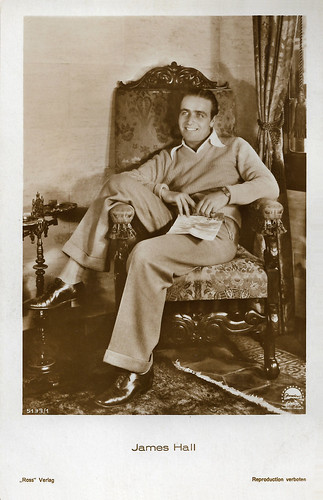
German postcard by Ross Verlag no. 5133/1, 1930-1931. Photo: Paramount.
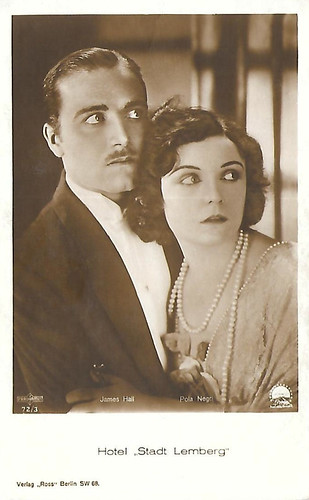
German postcard by Ross Verlag, Berlin, no. 72/3. Photo: Parufamet / Paramount. With Pola Negri in Hotel Imperial (Mauritz Stiller, 1927). Collection: Didier Hanson.

German postcard by Ross Verlag, no. 5590/1, 1930-1931. Photo: Paramount. James Hall and Jeanette MacDonald in Let's Go Native (Leo McCarey, 1930). Collection: Geoffrey Donaldson Institute.
Boyish and flattering
James Hall, whose real name was James E. Brown, was born in Dallas, Texas in 1900. He was one of four children of Clinton Pierce "Jack" Brown and his wife Alice Mckay Brown.
James was considered a talented athlete in his school days and joined an acting group at the age of 14. After a deployment in the First World War, he continued his acting career and appeared mainly in musical roles.
In the mid-1920s, he signed a studio contract with Paramount producer Jesse L. Lasky, whereupon the "boyish, flattering" Hall was a leading actor in the following years.
In 1928 he could be seen in the drama Four Sons, directed by John Ford as a German emigrant in the USA who is fighting against his homeland in the war.
Hall made his sound film debut in the crime mystery The Canary Murder Case (Malcolm St. Clair, 1929), opposite William Powell and Louise Brooks.
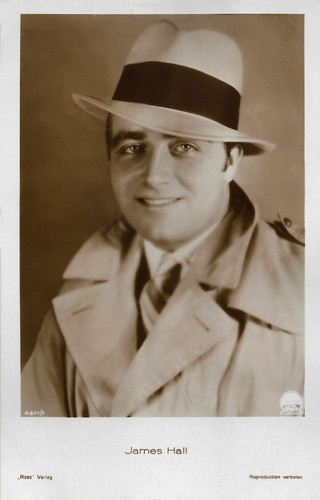
German postcard by Ross Verlag no. 4611/1, 1929-1930. Photo: Paramount.
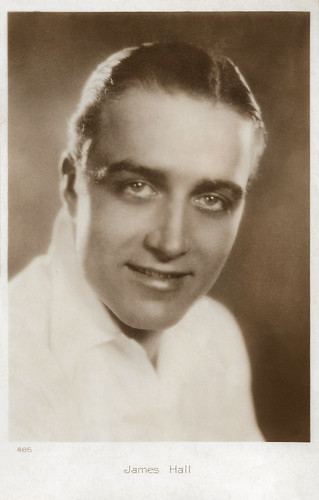
French postcard by Cinémagazine-Edition, Paris, no. 485.
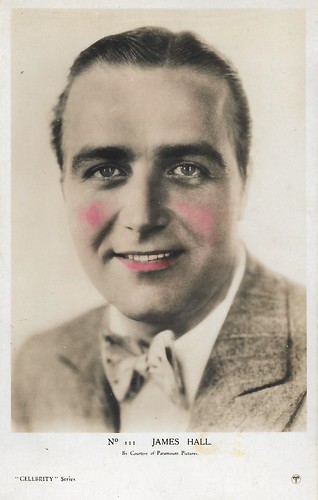
British postcard in the Celebrity Series, no. 111, by Associated Photo Printers, London. Photo: W & F Film Service / Paramount Pictures.

Spanish postcard in the Estrellas del cine series by Editorial Grafica, Barcelona, no. 104. Photo: Paramount Film.
Flying epic
With the dawn of the talkies at the end of the 1920s, James Hall's career was in descent, but in 1930 he was given what is probably his best-known role in Howard Hughes’ flying epic Hell's Angels. The film was directed by Hughes, Edmund Goulding, and James Whale and also starred Ben Lyon and Jean Harlow.
But while in 1928 he was still collecting $ 10,000 a week at The Fifty-Fifty Girl (Clarence Badger, 1928), two years later with Hell's Angels (Howard Hughes, 1930) it was only $ 2500.
After a few less noteworthy parts, James Hall's film career ended in 1932 and his last film role was in the drama Manhattan Tower (Frank R. Strayer, 1932).
Hall tried to gain a foothold in the theatre again. In the following years, he headlined in vaudeville at the Loew's State Theatres in 1932 and 1933 and in such independent stage productions as Ches Davis's 1934 edition of the 'Chicago Follies' and in another show, the 'Showboat Follies' at the Deadwood Theatre in South Dakota (1934). After that, he only received engagements for smaller nightclubs and cabaret shows.
Hall was married to Irene Gardner and the marriage ended in divorce. James Hall passed away in 1940 in Jersey City, New Jersey, USA, at age 39. He died of cirrhosis of the liver as a result of prolonged excessive alcohol consumption. He was buried in Holy Cross Cemetery in North Arlington.

German postcard by Ross Verlag no. 1638/1, 1927-1928. Photo: ParUfaMet / Paramount. James Hall in Hotel Imperial (Mauritz Stiller, 1927). The German film title was Hotel "Stadt Lemberg".
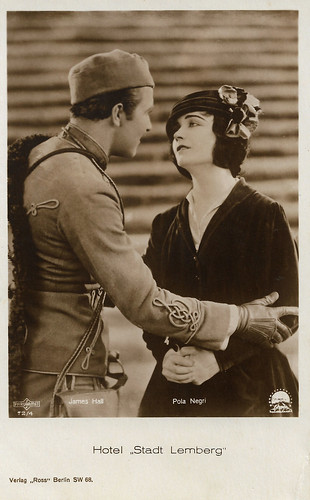
German postcard by Ross Verlag, Berlin, no. 72/4. Photo: ParUfaMet / Paramount. James Hall and Pola Negri in Hotel Imperial (Mauritz Stiller, 1927). The German film title was Hotel "Stadt Lemberg".

German postcard by Ross Verlag, no. 4120/1, 1929-1930. Photo: United Artists. James Hall and Vilma Banky in This is Heaven (Alfred Santell, 1929).

German postcard by Ross Verlag, no. 5590/1, 1930-1931. Photo: Paramount. James Hall and Jeanette MacDonald in Let's Go Native (Leo McCarey, 1930).
Sources: Kris 'Peterborough K' Peterson (Find A Grave), Wikipedia (German and English), and IMDb.
Interesting one, i love reading ur blog, keep going ;)
ReplyDelete